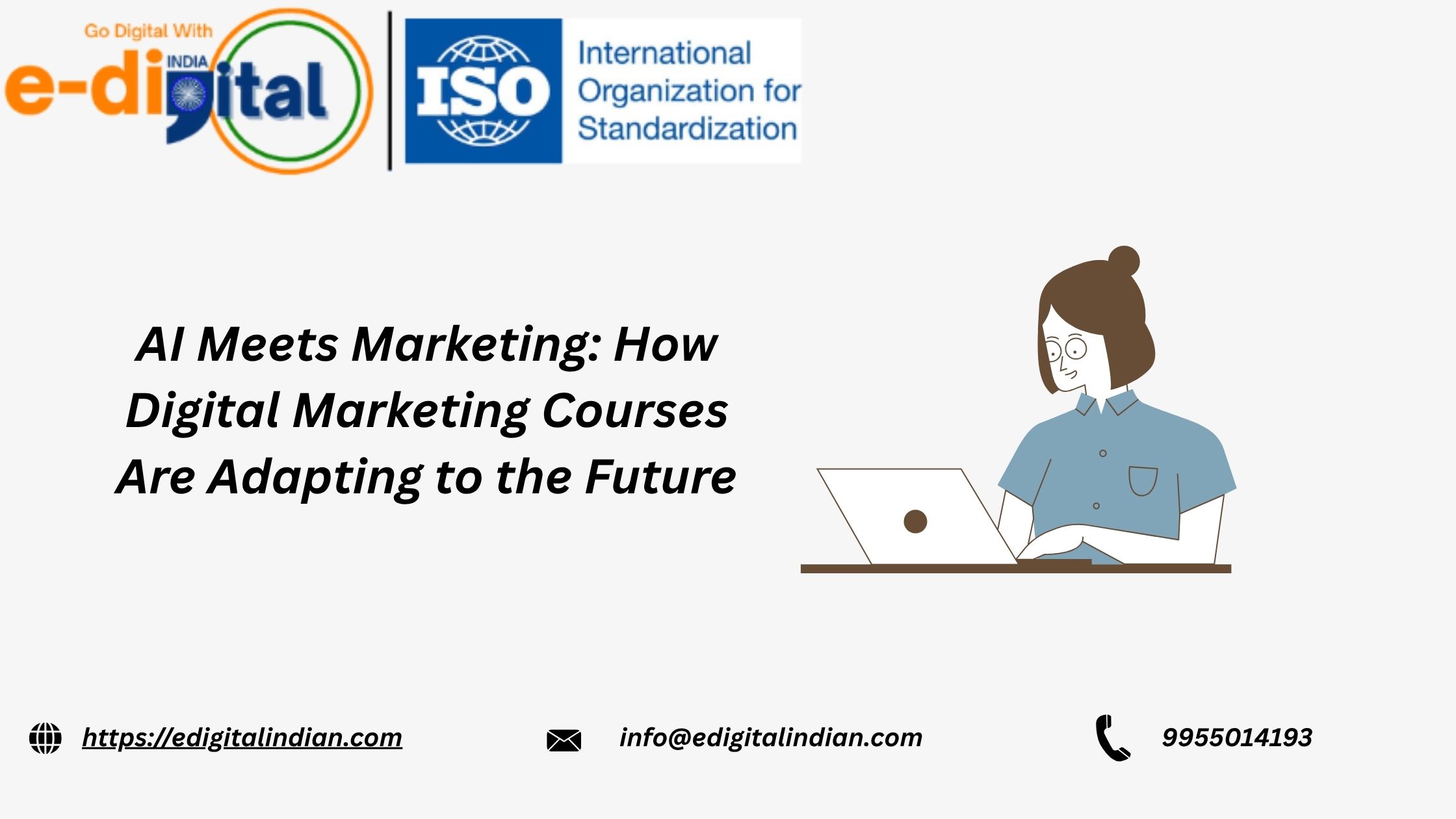Introduction
There has been a significant shift in the marketing industry. Once dominated by billboards, print ads, and television spots, today’s marketing landscape is fueled by algorithms, analytics, and artificial intelligence. In this fast-paced digital era, where personalization and precision are the keys to success, digital marketers are expected to not only understand consumer behavior but also harness the power of AI tools and technologies. As a result, digital marketing course across the globe are evolving—fast.
This article explores how the integration of AI in marketing is reshaping course curriculums, what new skills students must learn, and how educators are preparing the next generation of AI-savvy marketers.
The Rise of AI in the Marketing World
Artificial intelligence has made its way into nearly every component of digital marketing:
- Chatbots manage customer service 24/7.
- Predictive analytics helps forecast customer behavior.
- AI-driven content tools automate writing and design.
- Voice search optimization is reshaping SEO.
- Personalization engines drive higher conversion through real-time data.
According to a 2024 report by Salesforce, 61% of marketers already use AI in their marketing strategies, and 75% of them report a significant improvement in performance. As AI becomes indispensable in the marketing toolkit, the demand for professionals who can wield it strategically is skyrocketing.
Why Digital Marketing Courses Must Evolve
Traditional digital marketing education focused on core pillars like
- SEO and SEM
- Social media marketing
- Email campaigns
- Paid advertising
- Content strategy
- Analytics
While these skills are still essential, they now require an AI-first perspective. Marketers of the future won’t just manage campaigns—they’ll design automated systems, optimize algorithms, and train models to respond to user data in real time.
Educational institutions, online academies, and digital bootcamps must now ask themselves, are we preparing students for today’s challenges—or for tomorrow’s?
How Digital Marketing Courses Are Adapting
1. Incorporating AI-Driven Tools into the Curriculum
Modern digital marketing courses are integrating hands-on learning with the following tools:
- ChatGPT, Jasper, and Copy.ai for AI content generation
- Canva with Design studio with AI assistance
- Clearscope for AI-powered content optimization
- Surfer SEO Salesforce, and HubSpot Analysis of consumer data using AI Adzooma and Smartly.io for managing ad campaigns automatically
The students are no longer just learning what to do—they’re learning how AI tools can do it better, faster, and more efficiently.
2. Teaching Prompt Engineering and AI Communication
To use AI tools effectively, marketers need to communicate clearly with machines. That’s where prompt engineering comes in.
Courses are beginning to teach
- How to write prompts that deliver the best content
- How to refine queries for tools like ChatGPT or Claude
- How to blend human creativity with AI output for branding and messaging
This hybrid skill is becoming as essential as writing copy or analyzing metrics.
3. AI Ethics and Data Responsibility Modules
With great AI power comes great responsibility. Nowadays, teaching digital marketing must include ethical issues.
New courses include
- Ethical use of AI-generated content
- Understanding data privacy and GDPR compliance
- Bias in AI algorithms and how to mitigate it
- Transparency in automated decision-making
This shift ensures students aren’t just skilled—they’re socially responsible marketers too.
4. Real-Time Personalization Techniques
AI allows marketers to personalize content in real time. Courses now demonstrate how to use
- Recommendation engines (like those used by Amazon or Netflix)
- Dynamic ad personalization
- Behavioral segmentation through tools like Segment or Optimove
The goal? Teach students to tailor experiences based on behavior, not just demographics.
5. Artificial Intelligence in Voice Search and SEO
The SEO industry is changing. AI now plays a role in:
- Keyword clustering and search intent analysis
- Voice and visual search optimization
- Core Web Vitals analysis using AI bots
- AI-generated meta tags and schema markup
Digital marketing courses are integrating these new aspects into their SEO modules, ensuring learners stay ahead of Google’s algorithm changes.
Who’s Leading the Way in AI-Based Digital Marketing Education?
Top Platforms Adapting to AI Trends:
- Google Digital Garage now includes machine learning basics.
- HubSpot Academy features AI modules for content and CRM.
- Coursera and Udemy offer AI in marketing specialization tracks.
- Marketing, ML, and AI are all included in Simplilearn’s and Great Learning’s programs.
Many institutions also bring in AI marketing experts as guest lecturers to bridge the gap between academic learning and real-world trends.
Skills Students Now Need to Succeed in AI-Driven Marketing
To thrive in this new era, marketers must go beyond basic tactics. Skills now in demand include:
- Prompt Engineering
- Marketing Automation Setup
- Data Analysis and Visualization
- Machine Learning Basics
- Customer Journey Mapping Using AI
- AI Chatbot Design and Implementation
- Neuro-marketing and Behavioral AI Insights
Soft skills like critical thinking, creativity, and adaptability are also more vital than ever.
Challenges in Adapting Courses to AI
Adapting digital marketing education isn’t without its obstacles:
- Rapid pace of AI development makes curriculum updates challenging.
- Students may have restricted or costly access to AI tools.
- Educator readiness—not all instructors are trained in AI.
- Balancing tech with strategy—tools must serve the brand, not overshadow it.
Despite these hurdles, forward-thinking institutions are committed to continuous curriculum innovation.
The Future of Digital Marketing Education: What’s Next?
Here’s what the next wave of digital marketing courses may look like:
- AI-first learning models where students co-create campaigns with bots.
- Live AI labs for testing content generation, targeting, and optimization in real time.
- virtual marketing internships that use gamification and AI simulations.
- Specialized tracks, like “AI for Performance Marketing” or “Conversational AI in Brand Building.”
This isn’t a futuristic fantasy. Many of these innovations are already being piloted in leading ed-tech institutions today.
Suggested read: Best Digital Marketing Course in Jharkhand with Placement
Final Thoughts: Prepare Today for Tomorrow’s Marketing
Artificial intelligence is not just a trend—it’s the new foundation of digital marketing. As technology becomes more intelligent, marketers must become more strategic. Digital marketing courses are quickly evolving to meet this demand, blending technology with creativity, automation with ethics, and innovation with insight. Whether you’re a student, a career-switcher, or a marketing professional, learning how AI is changing the rules is no longer optional—it’s essential. So, the next time you browse a digital marketing course, ask yourself, is this course preparing me for the future—or just the present? Because in the world of AI and marketing, the future isn’t years away.



